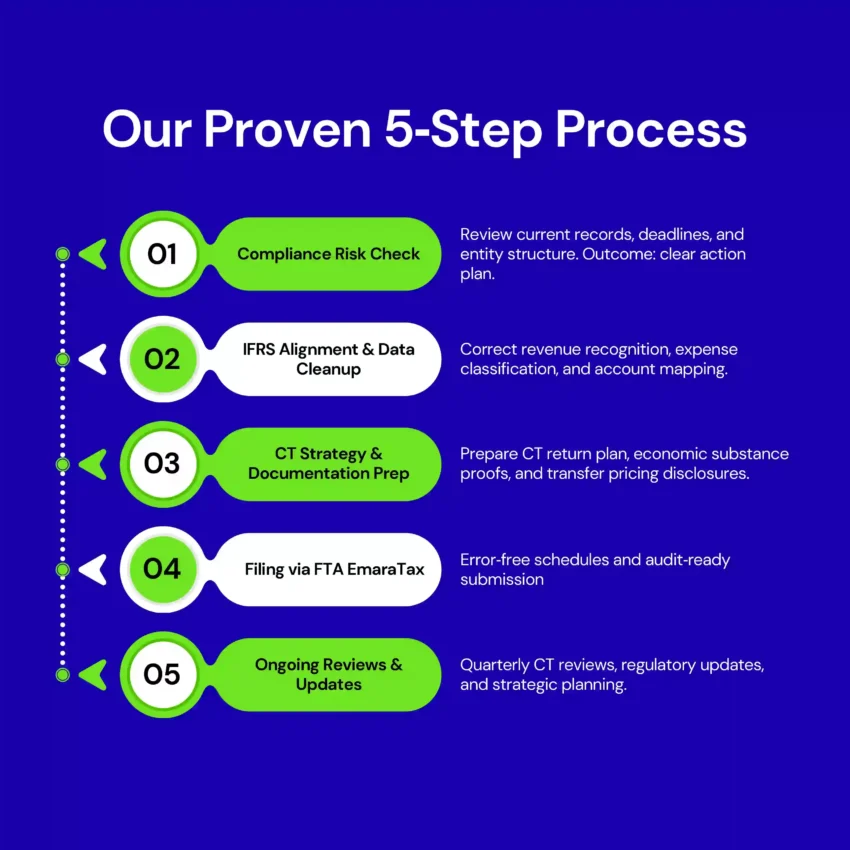IFRS‑Compliant Corporate Tax Accounting & Bookkeeping in UAE
- Certified UAE Tax Agents & IFRS Specialists
- Average Filing Turnaround: 10 to 15 working days
- 30,000+ Clients across 40+ industries in UAE
- Audit‑Ready Guarantee: Documentation packaged to withstand FTA scrutiny

Why UAE Businesses Choose Us for CT Accounting & Bookkeeping
| Common Problems We Solve | Our Proven Solutions |
|---|---|
| Missed CT Registration or filing deadlines lead to automatic and substantial administrative penalties | Deadline management with automated reminders and on-time filings |
| Inaccurate IFRS statements that cause rejected filings and audit risks | IFRS-compliant books prepared by certified UAE Tax Agents |
| Free Zone/QFZP status at risk due to missing economic substance proofs | Free Zone & QFZP compliance packs with substance documentation |
| Confusing transfer pricing rules causing unintentional non-compliance | Transfer pricing analysis, disclosure, and documentation ready in 30 days or less |
| Time drain on internal teams can lose focus on revenue-generating work | Full outsourcing at up to 44% lower cost than in-house |

How We Take You from First Call to Fully Compliant
At Farahat & Co., we have built a sophisticated process, which removes every point of friction. Our team handles the heavy lifting so you can focus on running your business.
- We review your current records, deadlines, and entity structure. You will know exactly where you stand and what needs fixing first. Here are the steps
- We bring your books into full IFRS compliance to correct revenue recognition, expense clarification, and account mapping.
- We prepare your CT return plan, economic substance proofs (if Free Zone or QFZP), and any transfer pricing disclosures.
- We file via the FTA EmaraTax portal to ensure every schedule is error-free and audit-ready.
- You get quarterly CT reviews, regulatory updates, and strategic planning to keep you ahead of changes.
- Average onboarding to first filing: 10 to 15 business days
- FTA audit‑ready documentation every single time
IFRS-Compliant Financial Record Keeping
UAE Corporate Tax Law requires financial statements to be prepared in accordance with applicable accounting standards (IFRS, or IFRS for SMEs where permitted). Cash‑basis accounting may be allowed only in limited circumstances subject to FTA conditions or approval.IFRS compliance extends beyond basic bookkeeping, including appropriate revenue recognition, lease accounting, and impairment provisioning aligned with the standards in force.
In addition, Ministerial Decision No. 114 of 2023 says for entities meeting specified thresholds, additional accounting and reporting requirements may apply. Noncompliance can lead to substantial administrative penalties and heightened audit risk.

Expense Classification and Documentation
- Deductibility rule: Expenses must be wholly and exclusively incurred for business purposes to be deductible.
- Common deductible items: Employee salaries, business rent, utilities, marketing, and professional fees, subject to general limitation rules.
- Restricted/non‑deductible: Entertainment may be partially restricted; corporate income tax is not deductible; personal expenses and costs linked to exempt income are disallowed.
- Why it matters:Accurate classification maximizes legitimate deductions and reduces challenges during FTA review.

Transfer Pricing Documentation Requirements

Tax Grouping vs. Qualifying Group Analysis
- Tax Group: Consolidated CT filing for entities meeting ownership and control criteria, enabling group‑level loss offset and streamlined compliance.
- Qualifying Group: Relief mechanisms for transfers and certain transactions where eligibility conditions are met.
- Why decide early: The optimal structure affects current‑year liabilities and multi‑year compliance. A short assessment avoids missed relief and rework.
FAQs About CT Accounting & Bookkeeping
How is CT bookkeeping different from regular bookkeeping?
We prepare your ledgers, classifications, and statements in line with IFRS and UAE CT requirements. We ensure your books match exactly what the FTA expects, not just what your accountant prefers.
Do you work with my existing accounting software?
Yes, we integrate with Xero, QuickBooks, Zoho Books, Tally, and others, or we can run your books on our own cloud system with FTA‑ready outputs.
Will you coordinate with my auditor for CT filings?
Absolutely, we liaise directly with your UAE‑licensed auditor so that audited financial statements and CT returns align perfectly.
Can you fix bookkeeping errors from past years?
Yes, we perform “catch‑up” and “clean‑up” bookkeeping, correcting IFRS and CT compliance errors before preparing and filing returns.
How do you keep my business audit‑ready?
We maintain all required records for seven years, prepare economic substance proofs where needed, and compile TP documentation in advance, so nothing is rushed during an audit.
Do you serve both mainland and free zone companies?
Yes, with tailored workflows for each entity type, including QFZP compliance packs for free zone businesses.